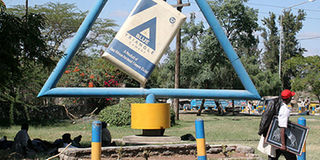Portland Cement on its knees as employees go without salaries

A signpost near the entrance to the East African Portland Cement Company factory in Athi River.
The cash-strapped East African Portland Cement in Athi River is on its knees, with employees going for the third month without their salaries and are now in a go-slow.
Production at the Nairobi Securities Exchange-listed company is said to have plummeted for the last four months, and it almost halted operations after one of its major kilns broke down.
These issues come after the government-owned cement processor rolled out an ambitious five-year business modernisation and expansion plan to push it into profitability.
It is a major test for new Managing Director Oliver Kirubai, who took the helm in September 2021.
"We have not been receiving salaries for the last three months. We have only been receiving empty promises from the management. We are hopeless,” said an employee in confidence in order to avoid victimisation.
Production is said to have declined significantly to almost a total halt. The company's major kiln has not been operating, with managers blaming clinker shortage. It has also been accused of delays in remitting statutory deductions to the relevant agencies.
"The production department has been active. The major kiln broke down almost two months ago. We are waiting for it to be fixed. Most of the time we remain idle,” said an employee.
The Nation yesterday checked selected major cement outlets in Kitengela and Athi River towns and learned that there is a low supply of Portland-branded cement. There were also few delivery trucks queuing at the factory’s main gate.
Cement supplier
"Portland cement supply is minimal. We don't have a large stock of the company’s brands,” said John Wambua, a cement supplier in Kitengela.
Portland’s financial problems are not new and has had two rounds of lay-offs in the past four years.
The sackings began in 2018, with 800 workers let go. A pay cut of 40 percent was also imposed.
Dozens of contracted workers were also fired in October 2019, and 136 workers, including senior managers and supervisors, received termination letters.
A bloated workforce and declining market share had sent the one-time cement giant into a cash crisis, compelling the board to start a turnaround strategy in 2019.
In a statement recently, MD Kirubai said the company was moving to adopt the strategy.
“We are at the tail end of our balance sheet restructuring and this coincides with the start of a new business period of a disciplined, performance driven culture where we expect to outgrow the regional cement market. We are looking at going beyond Kenya into Rwanda and DRC as well,” he said.
The company hopes to achieve 70 percent mid-term growth on productivity.
In April, the company announced an 11 percent increase in the retail prices of its cement from Sh530 to Sh590 per bag.
In 2019, the board passed a resolution to dispose of part of its 16,000-acres land to raise Sh45 billion to settle debts and turn around the company.
KCB Bank was to be given priority in the sale of the land to recover Sh5.4 billion lent to the manufacturer.
Portland has since transferred 745 acres in Athi River valued at Sh5 billion as it raises money to pay off the KCB loan that had accrued to Sh6.6 billion, after the process was endorsed by a Nairobi court last year.
Neither Mr Kirubai nor corporate affairs and strategy manager Gordon Mutugi could be reached for comment.





